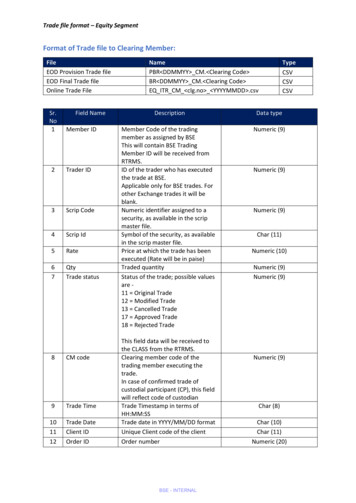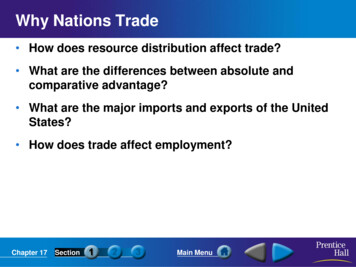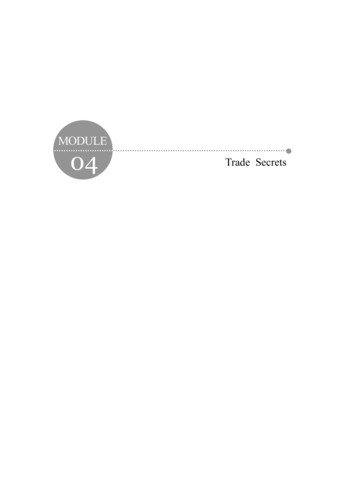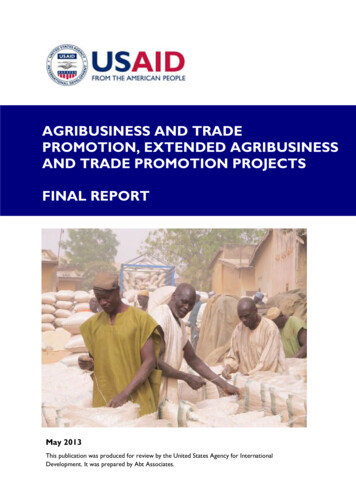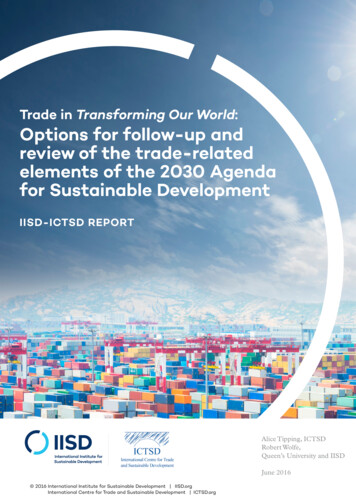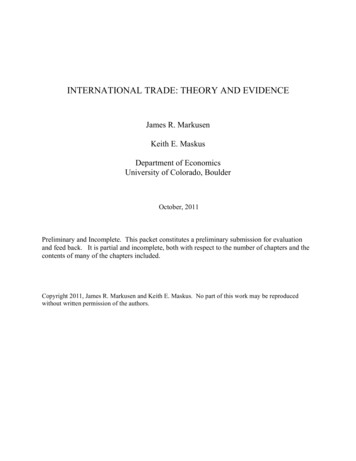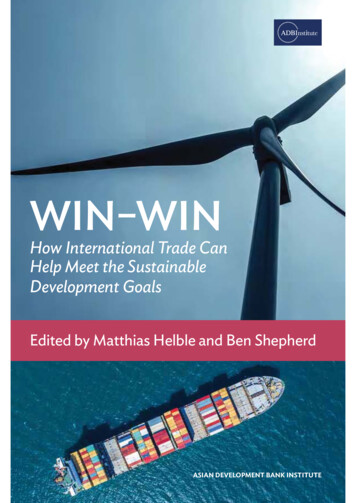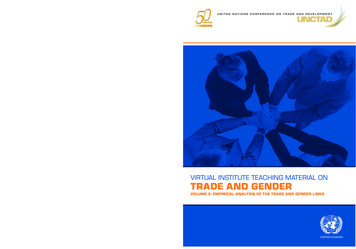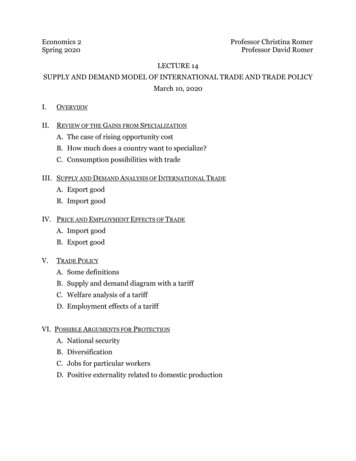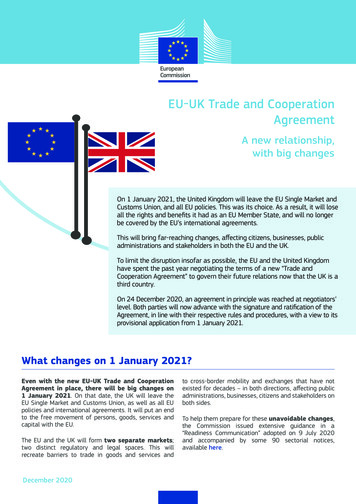
Transcription
EU-UK Trade and CooperationAgreementA new relationship,with big changesOn 1 January 2021, the United Kingdom will leave the EU Single Market andCustoms Union, and all EU policies. This was its choice. As a result, it will loseall the rights and benefits it had as an EU Member State, and will no longerbe covered by the EU’s international agreements.This will bring far-reaching changes, affecting citizens, businesses, publicadministrations and stakeholders in both the EU and the UK.To limit the disruption insofar as possible, the EU and the United Kingdomhave spent the past year negotiating the terms of a new “Trade andCooperation Agreement” to govern their future relations now that the UK is athird country.On 24 December 2020, an agreement in principle was reached at negotiators’level. Both parties will now advance with the signature and ratification of theAgreement, in line with their respective rules and procedures, with a view to itsprovisional application from 1 January 2021.What changes on 1 January 2021?Even with the new EU-UK Trade and CooperationAgreement in place, there will be big changes on1 January 2021. On that date, the UK will leave theEU Single Market and Customs Union, as well as all EUpolicies and international agreements. It will put an endto the free movement of persons, goods, services andcapital with the EU.The EU and the UK will form two separate markets;two distinct regulatory and legal spaces. This willrecreate barriers to trade in goods and services andDecember 2020to cross-border mobility and exchanges that have notexisted for decades – in both directions, affecting publicadministrations, businesses, citizens and stakeholders onboth sides.To help them prepare for these unavoidable changes,the Commission issued extensive guidance in a“Readiness Communication” adopted on 9 July 2020and accompanied by some 90 sectorial notices,available here.
Examples of inevitable change on 1 January 2021: Thefree movement of persons will end: UK citizens will no longer have the freedom to work,study, start a business or live in the EU. They will need visas for long-term stays in the EU. Borderchecks will apply, passports will need to be stamped, and EU pet passports will no longer be validfor UK residents. Thefree movement of goods will end: Customs checks and controls will apply to all UKexports entering the EU. UK agri-food consignments will have to have health certificates andundergo sanitary and phytosanitary controls at Member States’ border inspection posts. This willcost UK businesses time and money. Thefree movement of services will end: UK service providers will no longer benefit from thecountry-of-origin principle. They will have to comply with the – varying – rules of each MemberState, or relocate to the EU if they want to continue operating as they do today. There will be nomore mutual recognition of professional qualifications. UK financial services firms will lose theirfinancial services passports.The new EU-UK Trade and Cooperation Agreement:What has been agreed?On 24 December 2020, EU and UK negotiators reachedan “agreement in principle” on the text of a new“Trade and Cooperation Agreement” to govern theirrelations now that the UK has left the EU. Both partiesmust now advance with the signature and ratificationof this Agreement in line with their respective rules andprocedures, with a view to its provisional application asfrom 1 January 2021.It confers rights and obligations on each party,while fully respecting their regulatory and decisionmaking autonomy.While the new EU-UK Trade and CooperationAgreement will by no means match the level ofcooperation that existed while the UK was an EUmember, it goes well beyond traditional free tradeagreements and provides a solid basis for preserving ourlongstanding friendship and cooperation going forward.In addition, the Agreement does not cover any decisionsrelating to equivalences for financial services. Nor doesit cover possible decisions pertaining to the adequacyof the UK’s data protection regime, or the assessmentof its sanitary and phytosanitary regime for the purposeof listing it as a third country allowed to export foodproducts to the EU. These are and will remain unilateraldecisions of the EU and are not subject to negotiation.It consists of:1.2.3.4.an unprecedented free trade agreement, ambitious cooperation on economic, social,environmental and fisheries issues,a close partnership for citizens’ security,an overarching governance framework.The Agreement reflects the fact that the UK is leavingthe EU’s ecosystem of common rules, supervision andenforcement mechanisms, and can thus no longer enjoythe benefits of membership or the Single Market.At the UK’s request, the Agreement does not covercooperation on foreign policy, external security anddefence, even though this was initially foreseen in thePolitical Declaration.
One deal, 4 major pillars of cooperationNew EU-UK Trade and Cooperation AgreementTrade, economic, social, environmental & fisheriesFree, fair &sustainable trade‣‣ Trade in goods, incl. customs& regulatory cooperation‣‣ Services & investment‣‣ Digital trade, intellectualproperty & publicprocurement‣‣ Rules for fair competitionand sustainabilityConnectivity,sustainability & sharedopportunities‣‣ Transport‣‣ Energy‣‣ Fisheries & natural resources‣‣ Social security coordination‣‣ Union programmes‣‣ Thematic cooperationCitizens’ security‣‣ Law enforcement &judicial cooperation incriminal matters‣‣ Protection offundamental rights &personal data‣‣ Data exchange‣‣ Anti-money launderingPotentialEU unilateralmeasuresNot subject tonegotiation:‣‣ Adequacydecisionon dataprotection‣‣ UK thirdcountry SPSlisting‣‣ Equivalencesin financialservicesNew EU-UK governance framework for a lasting cooperation‣‣ Shared values & essential elements‣‣ Partnership Council‣‣ Dispute settlement, enforcement & sanctions mechanisms‣‣ Periodic reviewsFree, fair and sustainable tradeThe UK has chosen to leave the Single Market andCustoms Union. Trade with the EU can therefore nolonger be seamless. The EU-UK Agreement neverthelesscreates a free trade area of unprecented ambition, whichwill provide significant benefits to both sides comparedto trading under World Trade Organization terms.The Agreement is at the cutting edge of modern and sustainable trade policy. It commits both parties toupholding common high standards ensuring the protection of labour and social standards, environmental protection, the fight against climate change, including carbon pricing, and tax transparency. It alsocontains detailed principles on State aid to prevent either side from granting unfair, trade-distorting subsidies.These standards and principles are associated with domestic enforcement and dispute settlement mechanisms to ensure businesses from the EU and the UK compete on a level playing field. The parties have theright to take unilateral measures to safeguard their economies against unfair competition from the other party.The EU-UK Areement goes beyond recent EU free trade agreements with other third countries such as Canada or Japan, by providing for zero tariffs and zero quotas on all goods. This is especially important forsensitive goods such as agricultural and fishery products. For instance, without the agreement, exports ofcertain meat or dairy products would have faced tariffs above 40% under WTO rates, or 25% for canned fish– either way. Exports of cars would also have been hit by a tariff of 10%.To benefit from these exceptional trade preferences, businesses must prove that their products fulfil allnecessary ‘rules of origin’ requirements. This ensures that the trade preferences granted under theAgreement benefit EU and UK operators rather than 3rd countries, preventing circumvention. To facilitatecompliance and cut red tape, the Agreement allows traders to self-certify the origin of goods and providesfor ‘full cumulation’ (meaning traders can account not only for the originating materials used, but also ifprocessing took place in the UK or EU).Customs procedures will be simplified under the Agreement, as both Parties have agreed, e.g. to recognise each other’s programmes for trusted traders (“Authorised Economic Operators”). Nonetheless, as theUK has decided to leave the Customs Union, checks will apply to all goods traded. The Parties also agreedto cooperate on the recovery of customs duties, and in the fight against VAT and other indirect taxes fraud.
The Agreement will prevent unnecessary technical barriers to trade, e.g. by providing for self-declarationof regulatory compliance for low-risk products and facilitations for other specific products of mutual interest,such as automotive, wine, organics, pharmaceuticals and chemicals. However, all UK goods entering the EUwill still have to meet the EU’s high regulatory standards, including on food safety (e.g. sanitary and phytosanitary standards) and product safety.On trade in services, the EU and the UK have agreed to a level of openness going beyond the provisionsof the WTO General Agreement on Trade in Services (GATS), but reflecting the fact that the UK will no longer benefit from the freedom to supply services across the EU.Arrangements have been made to facilitate short-term business trips and temporary secondmentsof highly-skilled employees. EU service suppliers wanting to offer services in the UK will not be treatedany less favourably than UK operators in areas covered by the Agreement, so long as they comply withUK rules.PASSSimilarly, UK service suppliers in the EU will have to comply with host-country rules in each Member State,and will no longer benefit from the country-of-origin principle, mutual recognition (e.g. of professionalqualifications), or passporting rights for financial services. UK service suppliers and investors can alsoestablish themselves in the EU in order to offer services across the Single Market.As is standard practice, some sectors are excluded from the agreement on services: public services, services of general interest, some transport services, and audiovisual services to preserve cultural diversity.Connectivity, fisheries, sustainability and shared opportunitiesThe EU-UK Agreement also provides for broad economic,social and environmental cooperation in areas of mutualinterest. This cooperation in no way replicates the benefitsof EU membership, but serves to rebuild links that wouldotherwise be severed by the UK’s departure due to a lackof alternative international fall-back solutions.Transport is an essential driver of economic benefits in EU-UK relations. Some 210 million passengersand 230 million tonnes of cargo are carried between the EU and the UK each year. The EU-UK Agreementwill ensure continued air, road and maritime connectivity, supporting these flows. Importantly, the Agreement includes provisions to ensure that competition between EU and UK operators takes place on a levelplaying field, ensuring high levels of transport safety, workers’ and passenger rights, and environmentalprotection.On aviation, UK airlines will no longer be considered as EU carriers and will lose existing traffic rights inthe EU. EU and UK carriers will be able to perform unlimited carriage of passengers and cargo betweenpoints in the EU and points in the UK (‘3rd & 4th freedoms’). Onward carriage (‘5th freedom’) will be possiblefor the carriage of cargo to/from a third country (e.g. Paris-London-New York), if Member States agree thisbilaterally and reciprocally with the UK. The Agreement also ensures cooperation on safety, security andair traffic management.On road transport, EU and UK hauliers will be able to carry cargo to and from any point of the other party’s territory, provided they meet agreed high standards on safety and working conditions. They will also beable to perform two extra operations within the other party’s territory (of which maximum 1 cabotage operation for UK hauliers), thus limiting the risk of having to travel back without a load. The Agreement alsoprovides for full transit rights (e.g. the right for Irish hauliers to cross the UK to reach the rest of the EU).Over the years, EU and UK energy markets have become deeply interlinked thanks to interconnectors(electricity cables and gas pipelines) built between them. Although the UK will no longer benefit fromSingle Market rights, the EU-UK Agreement will facilitate continued flows of energy – essential to thefunctioning of both economies – by putting in place new trading arrangements over interconnectors. Italso establishes an ambitious framework for cooperation on renewable energy and tackling climatechange (including a provision that would trigger the suspension of the agreement if either side breachesits commitment to the Paris Agreement on climate). A separate agreement also provides for wide-rangingcooperation on the safe and peaceful uses of nuclear energy.
The Agreement sets out new arrangements for the joint management of more than 100 shared fish stocksin EU and UK waters. Under the Agreement, EU fishing vessels will continue to have the current level of access to UK waters for a transition period of 5.5 years, with a gradual and balanced reduction of EU quotasin UK waters over time. From then on, the EU and the UK will hold annual consultations to agree on fishingopportunities with a view to sustainable management of fisheries and marine resources, while preservingthe activities and livelihoods of fishing communities reliant on those waters and resources.The Agreement provides for the UK’s continued participation in EU funding programmes aimed at generating mutual benefits in the areas of research and innovation and space. The programmes are: HorizonEurope, the Euratom Research and Training programme, the fusion test facility ITER, Copernicus, as wellas access to the EU’s Satellite Surveillance & Tracking (SST) services.The Agreement contains a number of social security coordination measures aimed at protecting theentitlements of EU citizens temporarily staying in, working in or moving to the UK and of UK nationalstemporarily staying in, working in or moving to the EU after 1 January 2021. A wide range of benefitsare covered, including old-age and survivors’ pensions, healthcare (e.g. European Health Insurance Card)pre-retirement benefits, maternity/paternity benefits related to the birth of a child, or accidents at work.A new framework for our citizens’ securityEnsuring the safety and security of EU and UK citizensagainst common and evolving threats such as crossborder crime and terrorism remains a shared priority,even if the UK has chosen to leave the EU and be athird country outside of the Schengen cooperationzone, which effectively excludes it from the EU’s areaof freedom, security and justice.Against this background, the EU and the UK havetherefore agreed to establish a new frameworkfor law enforcement and judicial cooperation incriminal matters, allowing for strong cooperationbetween national police and judicial authorities and theswift exchange of vital data.Close and comprehensive police and judicial cooperation with any third country must be accompaniedby solid and lasting guarantees for the protection of human rights and fundamental freedomsof individuals. The Agreement therefore commits the EU, its Member States and the UK to continue toprotect and give domestic effect to fundamental rights, such as those set out in the European Conventionon Human Rights (ECHR). In case of non-adherence by the UK, the EU will be able to suspend cooperationon law enforcement and judicial matters. The Agreement also includes a commitment by the EU and UKto uphold high levels of data protection standards. This will be ascertained by adequacy decisions takenunilaterally by each side.Effective and swift data sharing and analysis are increasingly central to modern law enforcement in thefight against serious international crime, terrorism and cybercrime. However, the UK will no longer havedirect, real-time access to sensitive EU databases that support the EU’s area of freedom, security andjustice – as this is provided only to Member States and very closely associated countries that accept allaccompanying obligations. Nonetheless, the EU-UK Agreement includes ambitious arrangements for timely, effective, efficient and reciprocal exchanges of air passenger data (known as Passenger Name Recordsor PNR), criminal record information, as well as DNA, fingerprint and vehicle registration data (‘Prüm data’).The EU-UK Agreement will enable effective cooperation between the United Kingdom and Europol andEurojust, in line with the rules for third countries established in EU legislation. This will help ensure robustcapabilities in tackling serious cross-border crime.The EU-UK Agreement will enable strong cooperation of police and judicial authorities between the EU andthe UK, for example supporting the swift surrender of criminals, avoiding lengthy extradition proceduresthanks to streamlined processes, strict deadlines, robust safeguards, procedural rights and judicial control.This level of cooperation is unprecedented for a non-Schengen third country. Under the agreement, the UKor EU Member States can nevertheless refuse surrender or ask for additional safeguards in a number ofspecific cases, namely in respect of own nationals.Finally, the EU-UK Agreement provides for cooperation on combating money laundering and the financing of terrorism.
A new EU-UK governance framework for a lasting cooperationUnderpinning the new EU-UK economic and internalsecurity partnerships, the EU-UK Agreement containsa chapter on governance that provides clarity on howthe Agreement will be operated and enforced. It wasconceived to be flexible and adaptable to specificneeds that may arise in different areas.In view of the scope and complexity of the EU-UK Trade and Cooperation Agreement, the EU insisted on asingle governance framework for the overall Agreement. This is the only way to give legal certainty tobusinesses, consumers and citizens, while avoiding the additional bureaucracy of multiple parallel structures.A Partnership Council will oversee the implementation of the Agreement. Comprised of representativesof the EU and the UK, the Partnership Council will meet in different configurations depending on the matterat hand. It will be the forum in which the parties will discuss any issues that might arise, with the powerto take binding decisions by mutual consent. It will be assisted in its work by Specialised Committees andWorking Groups.If a solution to a disagreement cannot be found between the EU and the UK, an independent arbitration tribunal can be established to settle the matter through a binding ruling. This horizontal dispute settlementmechanism covers most areas of the Agreement, including level playing field and fisheries.It is accompanied by credible and robust enforcement and safeguard mechanisms, including the possibility to suspend market access commitments, e.g. by reintroducing tariffs and/or quotas in the affectedsector. Both parties will furthermore be able to cross-retaliate if the other does not comply with a ruling ofan independent arbitration tribunal. For instance, a breach by one party that concerns a specific economicsector will allow the other party to retaliate with measures in other economic sectors. Finally, any substantial breach of obligations enshrined as “essential elements” of the Agreement (the fight against climatechange, respect for democratic values and fundamental rights, or non-proliferation) can trigger the suspension or termination of all or part of the entire EU-UK Agreement.BackgroundOn 23 June 2016, the United Kingdom held a referendum in which a majority voted to leave the EuropeanUnion (51.9% to leave and 48.1% to remain). After threeyears of negotiations, the EU and the UK agreed on aWithdrawal Agreement setting out the terms for theUK’s orderly departure from the Union and providing legal certainty in important areas, including: the protectionof citizens’ rights, the avoidance of a hard border on theisland of Ireland and a financial settlement.The Withdrawal Agreement entered into force on1 February 2020 and the United Kingdom ceasedto be a member of the EU. Nevertheless, the Withdrawal Agreement provided for a transition periodlasting until 31 December 2020, during which Unionlaw continues to apply to and in the UK. The EU and theUK used this period of status quo to negotiate a partnership for the future.On the EU side, the negotiations were led by the European Commission’s Chief Negotiator Michel Barnierand the Task Force for Relations with the United Kingdom (UKTF), based on a negotiating mandate set bythe Council, with the support of the European Parliament.Throughout the negotiations, the European Commission ensured a highly transparent and inclusive process, holding regular meetings with the 27 EU MemberStates, with the European and national parliaments,as well as with EU consultative bodies, stakeholdersand civil society, and publishing all documents relevantto the negotiations on its website. European Union, 2020Reuse of this document is allowed, provided appropriate credit is given and any changes are indicated (Creative Commons Attribution4.0 International license). For any use or reproduction of elements that are not owned by the EU, permission may need to be soughtdirectly from the respective right holders.All images European Union, unless otherwise stated.PrintPDFISBN 978-92-76-27057-7ISBN 716KA-06-20-104-EN-CKA-06-20-104-EN-N
agreements and provides a solid basis for preserving our longstanding friendship and cooperation going forward. It consists of: 1. an unprecedented free trade agreement, 2. ambitious cooperation on economic, social, environmental and fisheries issues, 3. a close partnership for citizens' security, 4. an overarching governance framework.
